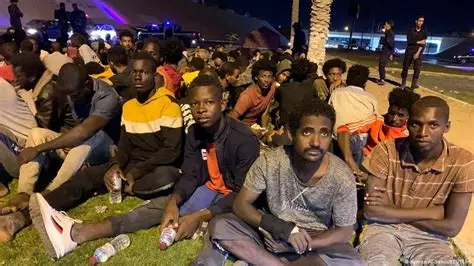Eastern Libyan authorities have deported over 700 Sudanese nationals back to their conflict-ravaged homeland as part of a sweeping crackdown on irregular migration, officials confirmed on Saturday.
The Directorate for Combating Illegal Migration in eastern Libya announced that the Sudanese deportees had been detained in recent operations across central and southeastern parts of the country. On Friday, they were escorted across the Libyan-Sudanese border by land.
Authorities said that among those expelled, several were diagnosed with infectious diseases such as hepatitis and AIDS, while others had previous criminal convictions or were removed for unspecified “security reasons.”
The deportation effort is part of a larger campaign orchestrated by forces loyal to eastern strongman Khalifa Hifter. The initiative includes widespread raids targeting smuggling routes and trafficking hubs particularly those operating in the sparsely governed regions of eastern and southern Libya.
Just last week, Libya’s eastern coast guard intercepted a vessel carrying 80 Europe-bound migrants off the coast of Tobruk. In a separate incident earlier this month, 104 Sudanese migrants including women and children were rescued from a traffickers’ warehouse in Ajdabiya, approximately 800 kilometers east of Tripoli.
Libya, with its porous borders and fragmented political landscape, has become a key transit route for migrants fleeing violence and poverty in sub-Saharan Africa and the Middle East. Human traffickers have capitalized on the country’s post-2011 instability, facilitating dangerous crossings across the desert and toward the Mediterranean coast.
The International Organization for Migration estimates that over 240,000 Sudanese currently reside in Libya, many having fled following the outbreak of violent conflict in Sudan in April 2023. That crisis, sparked by clashes between Sudan’s military and a powerful paramilitary force, has displaced millions and exacerbated regional instability.
Libya remains divided between rival governments in the east and west, each backed by armed militias and foreign allies. Despite occasional international efforts at reconciliation, the country continues to serve as both a destination and a departure point in the Mediterranean migration corridor.
Human rights organizations have voiced concerns about the deportations, warning of the grave risks awaiting returnees in Sudan, where widespread violence and humanitarian crises persist.


